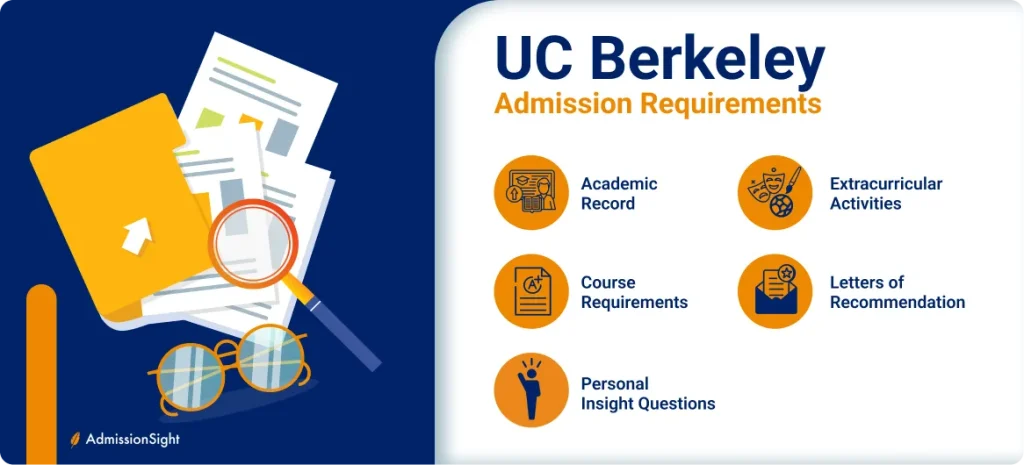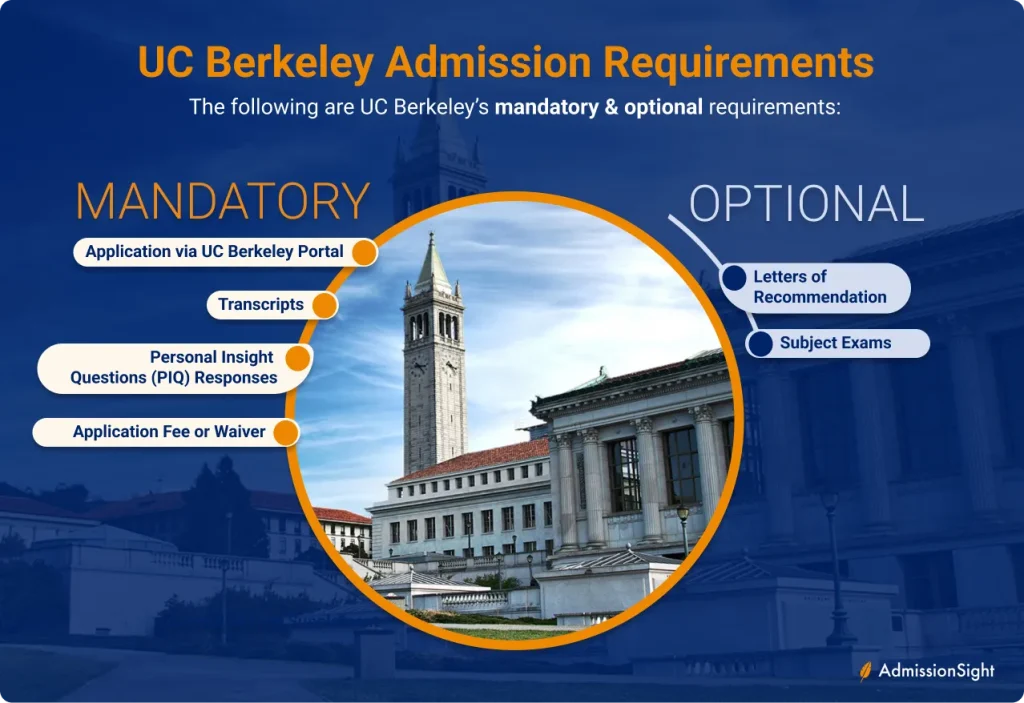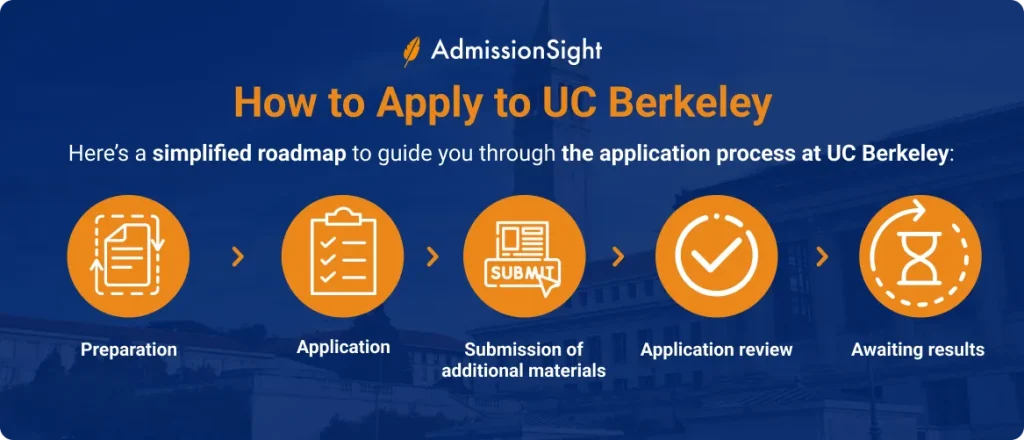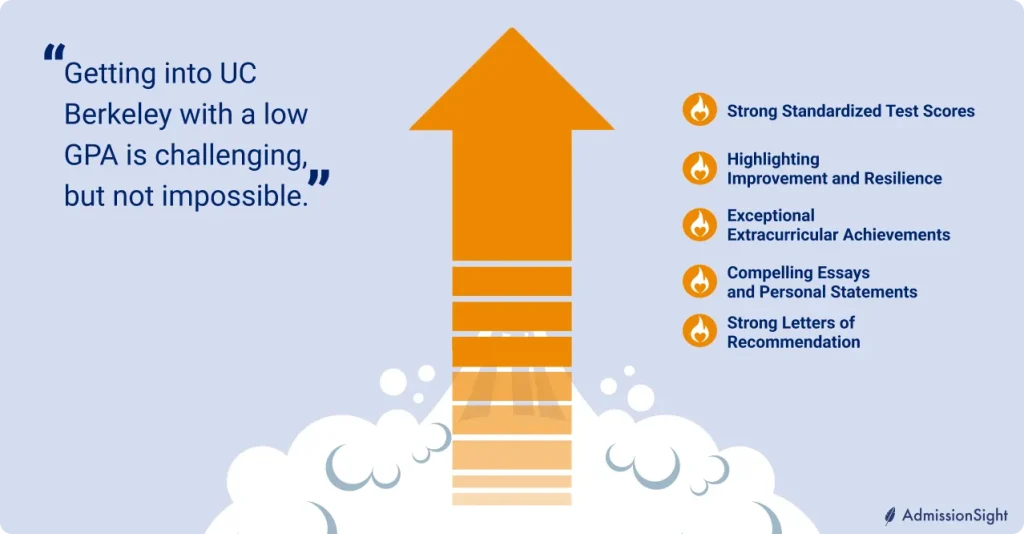How to Get into UC Berkeley: Admission Requirements and Tips
The University of California, Berkeley (UC Berkeley) is a top-tier university attracting a global pool of applicants. Gaining admission is a competitive process, demanding exceptional academic and extracurricular achievements.
This article is designed to be your roadmap to UC Berkeley admission. We’ll provide you with practical strategies and insights to enhance your application, significantly boosting your chances of joining the ranks of the Golden Bears.
Overview of UC Berkeley
Founded in 1868, the University of California, Berkeley is a cornerstone of the UC system. Located in the vibrant city of Berkeley, it’s just a stone’s throw away from the dynamic hub of San Francisco, offering students a rich blend of urban and academic life.
UC Berkeley holds an enviable position in global academia. It’s ranked as the #1 US public university, #6 among all national universities, and the #9 university globally, according to the Times Higher Education’s 2024 World University Rankings. This acclaim reflects its excellence in education and research.
The university has a history of producing distinguished alumni. Jennifer Doudna, co-inventor of the groundbreaking CRISPR gene editing technology, and Joan Didion, a celebrated author and journalist, are among its notable graduates. Their achievements underscore the university’s tradition of fostering innovation and intellectual prowess.
UC Berkeley is celebrated for its top-tier programs across various disciplines. Particularly renowned are its offerings in Computer Science, Environmental Science, and Political Science. This academic diversity and excellence are key attractions for prospective students.
Understanding UC Berkeley’s rich history, prestigious standing, and academic strengths is crucial in tailoring your application. Highlighting your aspirations and how they align with the university’s ethos and strengths can set your application apart.
Your commitment to excellence, innovation, and contributing to the university’s legacy should shine through in your application.
How Hard Is It to Get into UC Berkeley?
Gaining admission to UC Berkeley is no small feat. It is one of the most selective universities in the United States. Over the past five years, the acceptance rate at UC Berkeley has hovered around 11-17%.
This means that out of 10 applications, only less than two get in. UC Berkeley’s low acceptance rate indicates the intense competition and high standards you must meet to secure a spot.
UC Berkeley’s acceptance rate
In recent years, UC Berkeley’s acceptance rate has generally declined:
| Class | Acceptance Rate |
| Class of 2023 | 16.8% |
| Class of 2024 | 17.5% |
| Class of 2025 | 14.5% |
| Class of 2026 | 14% |
| Class of 2027 | 11.6% |
Most recently, for the Class of 2027, the university received a total of 125,910 applications, admitting only 14,566 students. The acceptance rate for this class was 11.6%.
These rates categorize UC Berkeley as one of the most competitive universities in the nation. The downward trend reflects not only the increasing volume of applications but also the university’s stringent selection criteria, highlighting the institution’s commitment to maintaining a high-caliber student body.
Prospective students should view this acceptance rate as a measure of UC Berkeley’s selectivity. It’s not just about the grades or test scores; the university seeks students who demonstrate a unique blend of academic prowess, extracurricular involvement, and personal characteristics that align with its values and mission.
Factors influencing the acceptance rate
When considering UC Berkeley’s acceptance rate, it’s important to look at the broader picture. Key factors include:
- Application Volume: The total number of applications received each year significantly impacts the acceptance rate. Higher application volumes generally lead to lower acceptance rates.
- Admissions Policy Changes: Any shifts in admission policies or criteria can affect the rate. This includes changes in standardized testing requirements or evaluation criteria.
- Academic Standards: The university’s rigorous academic standards play a crucial role. UC Berkeley consistently seeks students who not only excel academically but also show potential for further growth and contribution.
- University Reputation and Rankings: As UC Berkeley’s prestige and ranking rise, it attracts more high-caliber applicants, which in turn affects the competitiveness and selectivity of its admissions process.
UC Berkeley Admission Requirements
When applying to UC Berkeley, you need to meet these specific requirements:
- Academic Record: A strong academic record with a high GPA in challenging courses is crucial. UC Berkeley looks for students who have excelled in Advanced Placement (AP), International Baccalaureate (IB), or Honors courses.
- Course Requirements: Applicants must have completed specific course requirements in areas such as English, mathematics, science, foreign language, social studies, and visual/performing arts. These requirements ensure that students are well-prepared for the academic rigor of UC Berkeley.
- Personal Insight Questions: These are a series of short-answer questions designed to understand your character, achievements, and aspirations. Your responses should reflect your personality, resilience, and how you can contribute to the UC Berkeley campus culture.
- Extracurricular Activities: Involvement in extracurricular activities demonstrates your passions and leadership skills. UC Berkeley values applicants who have made meaningful contributions to their communities or areas of interest.
- Letters of Recommendation: This requirement is for select applicants only. Although only voluntary, submitting letters of recommendation are highly encouraged. These letters from teachers or counselors can provide insight into your academic potential and character.
It’s important to note that UC Berkeley has adopted a test-free policy. This means that SAT and ACT scores are no longer considered in the admissions process. This policy reflects the university’s commitment to a more equitable and comprehensive evaluation of applicants.
Overall, UC Berkeley employs a holistic admission process. This approach means that the admissions committee evaluates each applicant’s entire profile, including academic achievements, personal insight responses, extracurricular activities, and other factors.
This method aims to understand the full breadth of each applicant’s potential and fit for the UC Berkeley community, beyond just academic metrics.
What Does UC Berkeley Look for in Students?
It’s crucial for prospective students to understand what UC Berkeley values in its applicants. Knowing these values not only helps in tailoring your application to align with the university’s expectations but also provides insight into whether UC Berkeley is the right fit for you.
The following values are integral to what UC Berkeley seeks in its students. Demonstrating these qualities can significantly strengthen your application, showcasing you as a well-rounded individual who is ready to contribute to and benefit from the UC Berkeley community.
1. Achievements
UC Berkeley’s emphasis on achievements extends beyond academic performance. While strong grades are important, the university also values notable accomplishments in extracurricular activities. This includes significant contributions in areas such as sports, arts, science fairs, and community service.
Awards and recognitions at local, national, or international levels are also indicators of a student’s excellence and dedication in their fields of interest.
2. Initiative
The university highly regards students who show a proactive approach to their learning and interests. This means students who seek out learning opportunities, whether through advanced courses, research projects, or self-initiated learning endeavors.
Initiative also involves exploring new opportunities and areas of interest, demonstrating a willingness to step out of one’s comfort zone and a readiness to embrace new challenges.
3. Motivation and persistence
UC Berkeley looks for students who exhibit a strong drive and determination, especially when faced with obstacles. Motivation and persistence are seen in students who overcome personal, academic, or socioeconomic challenges, maintaining a focus on their goals despite difficulties.
This trait is crucial for success in UC Berkeley’s challenging academic environment, where resilience and the ability to persevere are key.
4. Leadership and service
The university values leadership experiences that show an ability to influence, guide, or contribute to groups or communities. This can be through roles in student government, clubs, sports teams, or community organizations.
Equally important is a commitment to service—volunteering, community engagement, and efforts to make a positive difference in the lives of others. This demonstrates a student’s capacity for empathy, social responsibility, and community involvement.
5. Special potential
UC Berkeley seeks students who bring unique talents, perspectives, or experiences that add to the diversity and richness of the campus community. This could be an unusual skill, an innovative project, a unique cultural background, or life experiences that provide a distinct viewpoint.
Such special potential indicates a student’s ability to contribute novel ideas and perspectives to the university.
6. Experience with other cultures
In our interconnected world, the ability to interact effectively with people from diverse cultures is invaluable. UC Berkeley appreciates students who have engaged with different cultures through travel, study abroad programs, learning foreign languages, or participation in multicultural communities.
This experience is indicative of a student’s adaptability, cultural sensitivity, and readiness to engage in a global dialogue.
UC Berkeley GPA Requirements
UC Berkeley has specific GPA requirements for admission. For California residents, a minimum GPA of 3.0 is mandatory, and for non-residents, the requirement is 3.4. These figures set a baseline for academic competence, ensuring that all applicants meet a fundamental standard of academic achievement.
While meeting the minimum GPA requirement is essential, it’s equally important to consider the average GPA of admitted students. The average unweighted GPA of those admitted is around 3.9. This significantly higher average than the minimum requirement reflects the highly competitive nature of UC Berkeley’s admissions.
The difference between the minimum GPA requirement and the average GPA of admitted students highlights the competitiveness of the applicant pool.
While meeting the minimum requirement is necessary, aspiring to the average GPA of admitted students can significantly enhance your chances. This average serves as a more realistic benchmark for what it takes to be a competitive applicant at UC Berkeley.
These GPA statistics provide a comprehensive picture of UC Berkeley’s academic expectations. The minimum ensures basic academic readiness, while the average GPA indicates the level of excellence typically demonstrated by successful applicants. Balancing these two aspects is crucial for a well-rounded and competitive application.
GPA recommendations
When aiming for admission to UC Berkeley, it’s advisable to set your sights higher than the minimum GPA requirements. Given the average unweighted GPA of admitted students is around 3.9, aspiring to reach or exceed these averages can significantly strengthen your application.
Here are some recommendations to help you achieve this goal:
- Aim for high grades, especially in advanced courses like AP, IB, or Honors classes, which can help raise your weighted GPA.
- Maintain a consistent academic performance throughout your high school years. Consistently high grades demonstrate your ability to handle academic pressures and challenges.
- If you’re struggling in certain subjects, don’t hesitate to seek extra help or tutoring. This can prevent dips in your GPA and show your commitment to learning and improvement.
- While challenging courses are important, balance them with courses in which you can excel to keep your GPA high.
- Good study habits and time management are crucial for maintaining a high GPA. Develop a study routine that allows you to excel academically while also engaging in extracurricular activities.
UC Berkeley Course Requirements
Understanding UC Berkeley’s course requirements is essential for high school students planning their curriculum. Knowing these requirements ensures that you take the necessary subjects to qualify for admission and demonstrates your preparedness for the academic rigors of college.
UC Berkeley requires the completion of a minimum of 15 college-preparatory courses (A-G courses), with a letter grade of C or better. At least 11 of these courses should be completed prior to your last year of high school. The required courses are:
- History: 2 years, covering topics that provide a historical overview and understanding of societal developments.
- English: 4 years, focusing on developing strong writing and analytical skills.
- Mathematics: 3 years, including subjects like algebra, geometry, and calculus.
- Science: 2 years, with lab experience, covering areas such as biology, chemistry, and physics.
- Foreign Language: 2 years or equivalent to the second level of high school instruction, demonstrating proficiency in a foreign language.
- Visual and Performing Arts: 1 year, engaging in creative subjects like music, drama, or visual arts.
- College-Preparatory Elective: 1 year, chosen from any of the above subjects or another university-approved course.
Course recommendations
When planning your high school curriculum with UC Berkeley in mind, consider these specific course recommendations to align with their requirements:
- History: Aim for a comprehensive understanding of history by taking courses such as US History, European History, AP European History, or other advanced history classes. These courses provide a strong foundation in understanding historical contexts and developments.
- English: Focus on developing strong language and analytical skills through courses like Freshman and Sophomore Language Arts, IBEnglish, AP Literature, and others. Excelling in these courses demonstrates your proficiency in critical thinking and communication.
- Mathematics: Engage in higher-level math courses such as Calculus, Statistics, AP Statistics, IB Calculus, or calculus courses offered at local junior colleges. These classes showcase your numerical and analytical capabilities.
- Science: Strengthen your scientific acumen by taking courses in Biology, Chemistry, Physics, AP Biology, AP Physics, IB Physics, IB Biology, etc. These subjects are crucial for developing a strong foundation in scientific principles and methods.
- Foreign Language: Gain proficiency in a language other than English by studying languages like Spanish, French, Latin, or more advanced courses such as AP Spanish or foreign language courses at a local junior college. This demonstrates your cultural awareness and linguistic skills.
- Visual Arts: Explore your creative side with courses in Art History, Photography, Web Design, AP Art History, or European Arts courses at local junior colleges. These subjects foster creativity and an appreciation for visual aesthetics.
- Electives: Choose electives that align with your interests and aspirations. Options like Economics, IB Economics, Computer Science, Psychology, Agriculture, and others can add depth to your academic profile and show a well-rounded approach to your education.
Additional tips
To further enhance your application to UC Berkeley, consider these other recommendations:
- AP and IB Classes: If available, enroll in Advanced Placement (AP) or International Baccalaureate (IB) programs. These advanced courses are particularly appealing to a university like UC Berkeley, which has a diverse and international student body.
- Junior College (JC) Courses: Consider taking courses at your local junior college. These can offer more diverse and specialized subjects, providing a unique edge to your application.
- Passion Projects: Pursue classes that align with your interests. Transform your favorite electives into passion projects, which can be a talking point in your application, showing your dedication and enthusiasm in specific areas.
UC Berkeley Personal Insight Questions
The Personal Insight Questions (PIQs) at UC Berkeley give you the opportunity to showcase aspects of your personality, experiences, and aspirations that aren’t evident in other parts of your application. They allow the admissions committee to gain a deeper understanding of who you are as an individual, beyond your academic achievements and extracurricular activities.
Well-crafted responses can significantly enhance your application, providing a more complete picture of your potential as a UC Berkeley student.
PIQ tips
To make the most out of your PIQ responses, consider these tips:
- Be authentic. Your responses should reflect your true self. Don’t try to impress by saying what you think the admissions officers want to hear. Authenticity resonates more than perfection.
- Show, don’t tell. Use specific examples and anecdotes to illustrate your points. This approach brings your experiences to life and makes your responses more memorable and impactful.
- Discuss how your experiences have shaped you and contributed to your personal growth. Reflecting on what you’ve learned from your challenges and successes shows maturity and self-awareness.
- Research UC Berkeley’s values and culture. Tailor your responses to reflect how you align with these values and how you can contribute to the university community.
- While being succinct, ensure that your responses comprehensively address the questions. Effective editing is key—make every word count.
- Seek feedback. Have someone you trust review your responses. Constructive feedback can help refine your answers and ensure they are clear and impactful.
- Take the time to revise and polish your responses. Well-written, error-free answers show your dedication and attention to detail, traits valued by UC Berkeley.
UC Berkeley Requirements for Extracurricular Activities
Extracurricular activities are a critical component of your UC Berkeley application. They offer a unique opportunity to showcase your personality, interests, and skills that aren’t captured by grades or test scores.
These activities demonstrate your ability to manage time effectively, pursue passions, and contribute to your community. UC Berkeley values well-rounded individuals who are not only academically proficient but also actively engaged in enriching experiences outside the classroom.
Extracurricular activities tips
Here are some strategies to maximize the impact of your extracurricular activities on your UC Berkeley application:
- Choose activities that genuinely interest you, rather than what you think might look good on a resume. Authentic passion is more compelling than a list of activities pursued solely for the sake of college applications.
- Aim for depth in a few activities where you can take on leadership roles or make significant contributions. Leadership positions or founding roles in clubs or organizations can be particularly impactful.
- Focus on activities where you can make a measurable impact or achieve something notable. This could be in the form of awards, recognitions, or tangible contributions to a cause or community.
- Consistency and long-term involvement in activities are more impressive than a scattering of short-term engagements. This demonstrates commitment, perseverance, and growth over time.
- While it’s important to be committed, having a balance of different types of activities can showcase your versatility and ability to engage in diverse interests.
- If possible, align some of your extracurriculars with your academic goals or intended major. This alignment can underscore your dedication to your chosen field of study.
- Be ready to reflect on what you’ve learned from your extracurricular activities and how they’ve shaped you as a person. This reflection can be a valuable asset in your personal insight questions and interviews.
Specific Areas that Can Boost Your UC Berkeley Application
To boost your academic and extracurricular profile for your UC Berkeley application, consider engaging in the following activities and programs that highlight your intellectual curiosity, passion, and community involvement.
Research
Engaging in research projects showcases your ability to conduct in-depth studies and contribute to academic knowledge, a highly valued skill at UC Berkeley.
- Simons Summer Research Program: This program provides high school students with the opportunity to conduct research under the mentorship of experienced scientists. Your participation demonstrates a deep engagement with scientific research and the ability to contribute to the scientific community, all of which are highly valued by UC Berkeley.
- Research Science Institute (RSI): Hosted by MIT, this prestigious program brings together talented students for intensive summer research. Your involvement in RSI signals a strong commitment to scientific inquiry and potential for academic excellence, particularly in STEM fields, which resonates well with UC Berkeley’s focus on innovation.
Competitions
Participating in academic competitions demonstrates your expertise and competitive spirit in specific subjects, aligning with UC Berkeley’s emphasis on academic excellence.
- Intel International Science and Engineering Fair (ISEF): Excelling in ISEF, a globally recognized science competition, demonstrates your capability to conduct high-level research and innovate. Success in such a competitive environment indicates a readiness for the challenges of a rigorous academic institution like UC Berkeley.
- American Mathematics Competitions (AMC): Achieving high scores in the AMC showcases not only your mathematical skills but also your analytical and problem-solving abilities. These competencies are essential for a student aspiring to excel in UC Berkeley’s challenging academic environment.
Summer programs
Involvement in summer programs, especially those at prestigious institutions, highlights your commitment to furthering your education and preparedness for university-level work.
- UC Berkeley Pre-College Scholars: This program allows high school students to experience college-level courses at UC Berkeley. Your participation shows a direct interest in the university and a desire to engage with its academic community, which can significantly enhance your application.
- Stanford University Mathematics Camp (SUMaC): SUMaC offers an immersive experience in advanced mathematics. By participating, you demonstrate a high level of mathematical ability and a keen interest in exploring complex mathematical concepts, aligning with UC Berkeley’s academic values.
Internships
Internships provide practical, real-world experience, showing your initiative and application of academic knowledge in professional settings.
- NASA High School Internship: Interning at NASA, you gain invaluable experience in STEM fields, showcasing your aptitude for research and innovation. This experience can make your application stand out by demonstrating your practical skills and commitment to scientific exploration.
- Johns Hopkins University Laboratory Internships: These internships provide practical laboratory experience, enhancing your understanding of scientific research processes and methodologies. Such hands-on experience is indicative of your proactive approach to learning and exploration, traits that UC Berkeley seeks in its prospective students.
Arts
Participation in the arts, whether in visual, performing, or literary arts, displays your creativity and ability to think innovatively, traits appreciated at UC Berkeley.
- National YoungArts Foundation: This prestigious program supports young artists in various disciplines like visual, literary, design, and performing arts. Your involvement demonstrates not just talent, but also dedication and a drive for artistic excellence, qualities that UC Berkeley values in its diverse student body.
- Interlochen Arts Camp: Known for its intensive training in music, theater, dance, visual arts, and creative writing, this camp offers an unparalleled opportunity to refine your artistic skills. Participation here signifies a deep engagement with the arts and a commitment to creative growth, enhancing your application’s appeal.
Sports
Involvement in sports demonstrates teamwork, discipline, and resilience, qualities that UC Berkeley values in its student body.
- AAU (Amateur Athletic Union) Sports: Achieving recognition in AAU sports demonstrates not only your athletic abilities but also essential qualities like discipline, teamwork, and resilience. Excelling in these sports can add a dynamic dimension to your UC Berkeley application.
- Junior Olympics: Participation in the Junior Olympics is indicative of a high level of commitment and accomplishment in athletics. This level of achievement underscores your dedication and ability to excel, aligning well with UC Berkeley’s ethos of striving for excellence.
School clubs
Active participation in school clubs, particularly in leadership roles, shows your ability to lead, collaborate, and engage in diverse interests.
- Model United Nations (MUN): Active involvement, particularly in leadership roles in MUN, highlights your abilities in critical thinking, public speaking, diplomacy, and global awareness. These skills are highly regarded at UC Berkeley, which values intellectual curiosity and global perspective.
- DECA: Engaging in DECA, especially if you participate in regional or national competitions, showcases your skills in business, entrepreneurship, and leadership. Success in DECA indicates a strong potential for innovation and leadership, traits highly respected at UC Berkeley.
Community service
Commitment to community service reflects your sense of social responsibility and empathy, aligning with UC Berkeley’s commitment to community and global awareness.
- Key Club International: Your participation in Key Club signifies a commitment to service and leadership. UC Berkeley appreciates students who are not only academically proficient but also actively involved in making a positive impact in their communities.
- Habitat for Humanity Youth Programs: Involvement in Habitat for Humanity illustrates a dedication to community building and social responsibility. These are key qualities that UC Berkeley seeks in its students, reflecting a commitment to societal betterment.
UC Berkeley Letters of Recommendation
Letters of recommendation can play a significant role in your UC Berkeley application. They provide additional academic and personal context that may not be apparent from grades and test scores alone.
These letters offer insights into your character, work ethic, and potential contributions to the university community. They can help the admissions committee to see you as a well-rounded individual, enhancing the overall strength of your application.
Take note that UC Berkeley has a unique policy regarding letters of recommendation. Only select applicants are invited to submit two letters of recommendation. While this submission is voluntary and not required for full consideration of the application, it is highly recommended for those invited. Unsolicited letters or supplemental information are not accepted.
Tips for recommendation letters
If you are invited to submit recommendation letters, consider the following tips:
- Select individuals who know you well and can speak specifically about your abilities and character. This might be teachers, counselors, or mentors who have observed your growth and contributions over time.
- Share your academic and extracurricular achievements, UC Berkeley goals, and any specific points you would like them to emphasize. This information can help your recommenders write more personalized and effective letters.
- Give your recommenders plenty of time to write thoughtful letters. Rushed letters may lack the depth and detail that make a strong recommendation.
- As your application deadline approaches, it’s okay to send a polite reminder to your recommenders if they haven’t submitted their letters yet.
- Regardless of the outcome of your application, be sure to thank your recommenders for their time and effort in supporting your academic journey.
Tips for recommenders
In line with UC Berkeley’s holistic review approach, recommenders are encouraged to focus on specific aspects that reflect the applicant’s strengths and potential. This guide ensures that the letters provide a comprehensive view of the applicant, complementing the other components of the application.
- Recommenders should discuss the applicant’s academic achievements and potential, considering their performance in the context of their high school class. This includes insights into the applicant’s intellectual curiosity and dedication to academic pursuits.
- Letters should highlight the applicant’s enthusiasm and passion for learning. This could be demonstrated through their engagement with challenging coursework, participation in academic clubs, or pursuit of independent study.
- Emphasize instances of leadership, whether in school, family, or community settings. This could include roles in student organizations, community service leadership, or taking initiative in family or community endeavors.
- Comment on the applicant’s resilience and perseverance, especially in overcoming personal, academic, or extracurricular challenges. This shows their ability to succeed despite obstacles.
- If applicable, describe the applicant’s experiences with diverse cultures, languages, or global perspectives. This could include participation in exchange programs, multilingual abilities, or involvement in multicultural events.
- Highlight examples of the applicant’s original thinking or creative approaches to problem-solving. This could be in academic projects, artistic pursuits, or innovative solutions in various contexts.
- Discuss instances where the applicant has shown empathy and concern for others. This could be through volunteer work, mentoring, or active participation in community service projects.
Is UC Berkeley Test-Optional?
UC Berkeley has adopted a test-free policy for its admissions process. This means that SAT and ACT scores are not considered in the evaluation of applications. This policy applies to all applicants, regardless of where they attended high school.
As an applicant, this test-free policy means that your SAT or ACT scores will not play a role in your admission decision. This shift places a greater emphasis on other aspects of your application, such as your GPA, coursework, personal insight responses, extracurricular activities, and letters of recommendation.
UC Berkeley’s move to a test-free policy is rooted in the desire to create a more equitable and holistic admissions process. The decision reflects a growing understanding that standardized test scores may not always be a reliable indicator of a student’s potential and abilities.
By removing this requirement, UC Berkeley aims to level the playing field for all applicants, especially those from underrepresented or disadvantaged backgrounds who may not have equal access to test preparation resources.
UC Berkeley SAT Requirements
It’s important to note that UC Berkeley has adopted a test-free policy, meaning SAT scores are not considered in the admissions process. However, for context, previous classes admitted to UC Berkeley had this range of SAT scores:
| Average SAT Score | 25th Percentile SAT Score | 75th Percentile SAT Score |
| 1415 | 1300 | 1530 |
These scores of admitted students at UC Berkeley were above the national average, reflecting the university’s competitive nature.
With the test-free policy, however, SAT statistics serve more as a historical reference rather than a guide for future applicants. They reflect the high academic standards of past applicants but are no longer a component of the admissions criteria. The emphasis has moved away from standardized test scores to other aspects of an applicant’s profile.
UC Berkeley ACT Requirements
UC Berkeley has adopted a test-free policy, meaning ACT scores are no longer considered in the admissions process. Historically, though, the typical ACT scores of admitted students were the following:
| Average ACT Score | 25th Percentile ACT Score | 75th Percentile ACT Score |
| 31 | 28 | 35 |
These scores of previously admitted students at UC Berkeley were generally above the national average, reflecting the university’s high academic standards. However, the shift to a test-free policy means these scores no longer play a role in admissions decisions.
Given the test-free policy, historical ACT statistics should be seen as a reference for past competitiveness rather than a current admissions criterion. They illustrate the caliber of students previously admitted but are not a factor in current admissions evaluations.
UC Berkeley Application Requirements
Now that you understand what UC Berkeley looks for in its students, it’s time to focus on the specific application requirements. Preparing these components thoroughly will enhance your application.
Mandatory requirements
- Application via UC Berkeley Portal: Access the UC Berkeley Application Portal to fill out your details, including personal, family, academic history, and extracurricular activities. Be thorough and honest in your responses, ensuring all information is accurate and complete.
- Transcripts: Self-report your grades accurately from your own transcripts. Double-check your entries against your official transcripts to ensure accuracy, as discrepancies post-admission can lead to serious consequences.
- Personal Insight Questions (PIQ) Responses: Answer the PIQs to give the admissions team insight into your personality and experiences. Reflect deeply on your experiences and use specific examples to illustrate your points.
- Application Fee or Waiver: Pay an application fee of $80 for each UC campus ($95 for international and non-immigrant applicants). Fee waivers are available for eligible U.S. citizens or permanent residents. If applicable, research and apply for the fee waiver well in advance to ensure you meet all criteria.
Optional requirements
- Letters of Recommendation: UC Berkeley may invite you to submit two letters of recommendation. Choose recommenders who know you well and can provide detailed insights into your abilities and character.
- Subject Exams: While not used for application review, subject exam scores can be submitted for placement purposes. Submit any strong subject exam scores you have, especially if they align with your intended major.
It is important to note that standardized test scores are not considered in the application review process. Moreover, additional materials like art portfolios and resumes are not considered during the application review.
How to Apply to UC Berkeley
Applying to UC Berkeley requires careful planning and attention to detail. This step-by-step guide will help you navigate the process from start to finish, ensuring you understand each phase of the application journey.
1. Preparation
Before you begin your application, thoroughly research UC Berkeley’s requirements and deadlines. This includes understanding the A-G subject requirements, GPA expectations, and any specific program prerequisites. Start this research early in your high school career to ensure you have ample time to meet all academic and extracurricular benchmarks.
2. Application
Access the UC Berkeley Application Portal to complete your application. This involves inputting personal information, academic history, extracurricular activities, and responding to Personal Insight Questions. Be honest and reflective in your responses, and proofread everything before submission.
3. Submission of additional materials
Submit two letters of recommendation (if invited) and any subject exam scores for placement purposes. Select recommenders who can provide detailed insights into your personality and achievements, and only submit subject exams if they strengthen your application.
4. Application review
After submitting your application, it enters the review process where each component is evaluated. During this time, stay informed by regularly checking your email and the application portal for any updates or additional requests from UC Berkeley.
5. Awaiting results
Decisions are typically released in the spring. If accepted, you’ll need to confirm your acceptance and complete any additional enrollment steps. Use this waiting period to explore financial aid options and housing arrangements if necessary.
How to Submit Supplemental Materials to UC Berkeley
UC Berkeley’s policy on supplemental materials is quite specific. For most programs, UC Berkeley does not require additional documents like transcripts or portfolios during the application review process.
As for supplemental materials such as art portfolios or resumes, UC Berkeley does not consider these during the application review. The university emphasizes the importance of thoroughly completing each section of the application to provide a full picture of the student’s experience and aspirations.
However, for certain programs like the Management, Entrepreneurship, & Technology (M.E.T.) Program, students who select a major in the M.E.T. Program as their primary major will receive instructions for supplemental information.
It’s important to note that students who selected an M.E.T. major as an alternate major will not be asked for supplemental information.
Submission methods
For first-year applicants who are invited to submit letters of recommendation, UC Berkeley requires that all letters be submitted electronically. Invited applicants will receive instructions via email to log into MAP@Berkeley, where they can add recommenders and submit their letters.
It’s important to note that requests for letters of recommendation are not found within the UC application but are sent as a supplemental request via email. The university does not accept letters by mail or courier.
Step-by-step guide
- Keep an eye on your email for any supplemental requests from UC Berkeley, especially if you have applied for specific programs like M.E.T.
- If invited, select your recommenders. One must be a teacher or instructor, and the other can be anyone who knows you well. Ensure they submit the letters electronically through the MAP@Berkeley portal.
- When filling out your UC application, accurately self-report your grades from your transcripts.
- For the UC application, you’ll need to respond to four out of eight essay prompts with a 350-word limit per response. These essays are an important part of your application and should be completed thoughtfully.
- Make sure all supplemental materials are submitted by the deadlines provided by UC Berkeley. For letters of recommendation, the deadline is typically January 3.
- Regularly log into the admissions portal to check the status of your application and ensure no additional information is requested.
Remember, each application to UC Berkeley is unique, and the requirements may vary depending on the program. Always refer to the latest information provided by the university for the most accurate guidelines.
UC Berkeley Scholarships and Financial Aid
Navigating the financial aid and scholarship opportunities at UC Berkeley is an essential step in ensuring your education is affordable and attainable.
Merit-based scholarships
UC Berkeley offers a variety of merit-based scholarships that recognize and reward academic excellence, leadership, and special talents. Among these, the Regents’ and Chancellor’s Scholarship stands out as the most prestigious award for entering undergraduates, acknowledging exceptional academic and leadership potential.
Another notable award, the Fiat Lux Scholarship, is granted based on academic merit and personal achievements. To enhance your chances of receiving these scholarships, it’s crucial to maintain a strong academic record and demonstrate leadership skills in your application.
Need-based scholarships
In addition to merit-based scholarships, UC Berkeley provides need-based financial aid, which encompasses grants, loans, and work-study options, tailored to your family’s financial circumstances. The Blue and Gold Opportunity Plan is a significant offering, covering tuition for families with incomes below $80,000.
Other forms of need-based aid include the Cal Grant and Federal Pell Grant, which are awarded based on financial need and do not require repayment. The Work-Study Aid program is an excellent opportunity for students to work part-time while studying, thereby contributing towards their educational expenses.
To be considered for need-based aid, ensure you complete the FAFSA or the California Dream Act Application accurately.
Other financial aid programs
UC Berkeley also offers innovative financial aid programs designed for specific groups of students. The Native American Opportunity Plan provides aid to Native American students by covering their tuition costs, and the Undergraduate Dream Act Aid offers financial assistance to AB 540 eligible students.
It’s beneficial to explore all available financial aid programs for which you might be eligible, including those targeted at certain demographics or backgrounds. This comprehensive approach to understanding and applying for financial aid and scholarships at UC Berkeley can significantly ease the financial burden of your education, allowing you to focus more on your academic and personal growth.
Does UC Berkeley Offer Early Decision?
UC Berkeley does not offer an early decision or early admission program for prospective students. The university maintains a single application period, with the filing period typically running from October 1st to November 30th each year.
As an applicant, this means you won’t have the option to apply early and receive an earlier admission decision from UC Berkeley. This uniform policy allows you to consider all your options and commitments before making a decision about where to attend college.
UC Berkeley Application Deadlines
Applying to UC Berkeley follows a specific timeline. The application process begins well before the actual submission deadline, so it’s crucial to be aware of these key dates:
- Applications become available in October of the year prior to the year you plan to enter UC Berkeley.
- The application filing period is from October 1st to November 30th. All applications must be submitted within this timeframe.
- Starting December 1st, you can apply for financial aid through the FAFSA or the California Dream Act.
Once you’ve submitted your application, the following dates are important:
- By early December, UC Berkeley notifies applicants of the receipt of their application.
- Decisions for first-year applicants are typically posted by the end of March.
- If accepted, first-year students must accept the offer of admission by May 1st.
These deadlines are crucial for ensuring your application is considered, and adhering to them is essential for a successful application process at UC Berkeley.
Is UC Berkeley More Prestigious Than UCLA?
The question of whether UC Berkeley is more prestigious than the University of California, Los Angeles (UCLA) is not straightforward and largely depends on specific criteria and personal priorities. Both universities are highly respected, but they offer different strengths and experiences.
UC Berkeley’s acceptance rate has been around 11-17% in recent years, indicating a highly selective admissions process. On the other hand, UCLA has shown an even more competitive trend, with its acceptance rate dropping to about 8-14%. While UCLA’s acceptance rate is more competitive, both rates reflect the high demand and rigorous selection criteria at both institutions.
As for program strengths, UC Berkeley is renowned for its strong programs in engineering, computer science, environmental sciences, and political science. It’s also known for its research output and faculty achievements. UCLA excels in programs related to film, medicine, law, and the arts, and it’s celebrated for its vibrant campus life and diversity.
Ultimately, both UC Berkeley and UCLA are prestigious institutions, each with its unique strengths and character. Your choice should be guided by your specific academic interests, career aspirations, and personal preferences for campus culture and location.
UC Berkeley or UCLA?
When choosing between UC Berkeley and UCLA, consider the following:
- If your interest lies in fields like engineering or computer science, UC Berkeley might be a better fit. For pursuits in film, medicine, or the arts, UCLA could be more aligned with your goals.
- Reflect on what type of campus environment and culture you prefer. UC Berkeley is known for its history of activism and intense academic atmosphere, while UCLA offers a more diverse and vibrant campus life.
- Consider the geographic location and lifestyle each campus offers. Berkeley is located near San Francisco, offering a more urban experience, while UCLA is in the heart of Los Angeles, close to the entertainment industry and diverse cultural experiences.
How Hard Is It to Get into UC Berkeley?
Gaining admission to the University of California, Berkeley, known as UC Berkeley, is a challenging endeavor due to its high academic standards and the large number of applicants each year. As one of the most prestigious public universities in the United States, UC Berkeley attracts a diverse and talented pool of applicants from across the globe. The acceptance rate, which represents the percentage of applicants who are offered admission, is an important metric to consider when evaluating the difficulty of getting into UC Berkeley.
Historically, UC Berkeley’s acceptance rate has been relatively low, indicating a competitive admissions process. For the Class of 2027, the acceptance rate was 11.69%. This low acceptance rate is partly because UC Berkeley is looking for students who not only excel academically but also bring unique skills, experiences, and perspectives to their campus community.
The admissions process at UC Berkeley is comprehensive. The university evaluates applicants based on several criteria, including academic performance (grades and the rigor of courses taken), standardized test scores (like the SAT or ACT, though these requirements can change), personal essays, extracurricular activities, and letters of recommendation. For those aiming to secure a place at UC Berkeley, it’s essential to focus on excelling academically while also engaging in activities that demonstrate leadership, initiative, and a commitment to one’s community.
Benefits of Attending UC Berkeley
UC Berkeley is not only known for its rigorous academic environment but also for the numerous benefits it offers to its students. Here are some of the key advantages of attending UC Berkeley:
- Academic Excellence: UC Berkeley is renowned for its high academic standards and rigorous coursework. It offers a wide array of programs across various fields, with some departments recognized as among the best in the world.
- Research Opportunities: As a leading research university, UC Berkeley provides ample opportunities for undergraduate and graduate students to engage in cutting-edge research, often working alongside world-renowned faculty members.
- Diverse Community: The university boasts a diverse student body, which enriches the learning experience by exposing students to different cultures, perspectives, and ideas.
- Professional Networking: Being part of such a prestigious institution allows students to build a strong professional network, which can be invaluable for future career opportunities.
- Location: Situated in the San Francisco Bay Area, UC Berkeley offers access to a vibrant urban culture, along with opportunities in industries like technology, finance, and the arts.
- Alumni Network: UC Berkeley has a vast and active alumni network, providing graduates with connections and resources that can be beneficial throughout their careers.
How Can an International Student Get into UC Berkeley?
To successfully apply to UC Berkeley as an international student, there are key requirements and strategies to consider:
- Academic Excellence: International students must meet the same freshman requirements as US residents, including a minimum GPA of 3.4, successful completion of the A-G course pattern, and either the SAT with Essay or the ACT with Writing exams.
- English Proficiency: Non-native English speakers must prove their proficiency through exams such as IELTS (minimum score: 6.5) or TOEFL (minimum score: 80).
- Completion of Secondary Education: Applicants must have finished secondary school and earned a certificate of completion that qualifies them for university admission in their home country.
- Application Insightfulness: The application should accurately reflect academic qualifications, extracurricular activities, and personal insights. It’s important to authentically represent oneself, showcasing unique perspectives and experiences rather than trying to fit a perceived ideal profile.
- Understanding Residency Implications: For admission purposes, international students are reviewed using the same criteria as domestic students, but for tuition purposes, they cannot be classified as California residents.
- Financial Considerations: International students are ineligible for federal, state, and need-based university financial aid in the U.S. However, they can explore scholarship opportunities from private organizations both in the U.S. and their home countries.
Each of these elements plays a crucial role in the admissions process, and understanding them can greatly enhance an international student’s chances of being admitted to UC Berkeley.
How to Get into UC Berkeley as a Transfer Student
To successfully transfer to UC Berkeley, students must complete the general education requirements and earn a minimum of 60 UC-transferable semester units (90 quarter units). Not all courses are transferable, and for non-California Community College students, specific guidelines determine transferable courses. A minimum GPA of 3.0 in all transferable coursework is required, along with lower division major preparation courses. Some majors may require a higher GPA in these courses.
Berkeley employs a comprehensive review process for transfer applications, focusing on academic achievements and personal qualities. This review considers the applicant’s full academic record, personal attributes such as leadership, motivation, and community involvement, and potential contributions to campus life. Achievements in academic enrichment programs are also valued.
Admission decisions consider the applicant’s context, including hardships faced and how they’ve been overcome. The review process recognizes diverse talents and creativity beyond traditional academic measures. There are also policies regarding unit maximums for transfer credits, including UC lower-division maximum transfer credit limitation and Unit Maximum Admissions Policy. Advanced Placement and International Baccalaureate exams can be used for unit credit, helping meet the unit minimum requirement without affecting the unit maximum admission policy.
Can an Average Student Get into UC Berkeley?
The prospect of gaining admission to UC Berkeley can seem daunting, especially for students who consider themselves “average.” However, it’s important to recognize that UC Berkeley’s admissions process is holistic. This means they consider more than just grades and test scores.
Focus on Strengths and Unique Qualities
If your academic record is average, it’s vital to highlight other strengths in your application. This could include exceptional skills, unique life experiences, strong leadership qualities, or significant extracurricular achievements. UC Berkeley seeks a diverse student body, not just in academic terms but in terms of experiences and perspectives as well.
Demonstrating Passion and Commitment
Showcasing your passion for your field of interest and your commitment to your goals can be very influential. If you have a particular area of interest, demonstrate how you have pursued this interest outside of your academic work. This could be through related extracurricular activities, volunteer work, or personal projects.
Letters of Recommendation
Letters of recommendation can also play a significant role, especially if they come from teachers or mentors who can speak to your abilities and potential beyond your grades. These letters should provide insight into your character, work ethic, and how you overcome challenges.
Overcoming Challenges
If there are specific reasons why your academic performance might not reflect your true potential, such as personal or family challenges, it’s important to communicate this in your application. UC Berkeley considers these factors as part of its comprehensive review process.
How to Get into UC Berkeley with a Low GPA
Getting into UC Berkeley with a low GPA is challenging, but not impossible. Here are some strategies that can help strengthen your application:
Strong Standardized Test Scores
If your GPA is on the lower side, achieving high scores on standardized tests like the SAT or ACT can help compensate. These scores can demonstrate your academic abilities and readiness for college-level work.
Highlighting Improvement and Resilience
If your GPA improved over time or if you performed well in courses relevant to your intended major, make sure to highlight this in your application. This can show your ability to adapt, learn, and improve, which are qualities valued by UC Berkeley.
Exceptional Extracurricular Achievements
Outstanding achievements in areas outside of academics can significantly strengthen your application. This includes achievements in sports, arts, leadership roles, or community service. These activities can showcase your talents, dedication, and potential to contribute to the campus community.
Compelling Essays and Personal Statements
A well-written essay or personal statement can provide context to your GPA and offer insights into your journey. Use this opportunity to explain any extenuating circumstances that may have impacted your academic performance and to demonstrate your passion, perseverance, and future aspirations.
Strong Letters of Recommendation
Letters of recommendation from teachers, counselors, or mentors who can vouch for your abilities, character, and potential can be incredibly valuable. These letters should provide a more comprehensive view of you as a student and individual, beyond just your academic performance.
In conclusion, while getting into UC Berkeley as a transfer student, an average student, or with a low GPA can be challenging, it’s not out of reach. Focusing on your strengths, showcasing your unique qualities, and presenting a well-rounded application can significantly improve your chances of admission. Remember, UC Berkeley values diversity in its student body, not just in terms of academic achievement but also in experiences, perspectives, and potential.
What Makes UC Berkeley Unique?
The University of California, Berkeley, often known simply as UC Berkeley, holds a special place in the realm of higher education. This prestigious institution is not just another university; it’s a hub of innovation, diversity, and academic excellence. Let’s delve into the unique aspects that set UC Berkeley apart.
A Tradition of Academic Excellence
UC Berkeley’s reputation for academic rigor is well-known. It consistently ranks among the top universities globally, a testament to its high-quality education and research. The university is home to a faculty that includes Nobel laureates, Fields Medal winners, and many other renowned scholars. This level of expertise ensures that students are learning from some of the best minds in their fields.
Pioneering Research and Innovation
Innovation is at the heart of UC Berkeley. It’s a place where groundbreaking research happens across various disciplines, from environmental science and engineering to social sciences and humanities. The university’s research centers and labs are often at the forefront of discovering new knowledge and technologies, contributing significantly to advancements in various fields.
A Commitment to Public Service
UC Berkeley stands out for its strong commitment to public service. As a public university, it dedicates itself to serving the broader community through various programs and initiatives. This principle of giving back is ingrained in the university culture, encouraging students to engage in community service and social justice projects.
Vibrant Campus Life and Culture
The campus life at UC Berkeley is as diverse as its student body. With hundreds of student organizations, there are various cultural, political, and recreational activities. The university is known for its vibrant campus culture, fostering a sense of community and belonging among its students.
What Does the UC Berkeley Application Look Like?
Applying to UC Berkeley is a process that requires careful preparation and attention to detail. The application is designed to evaluate not just academic proficiency but also the personal qualities and potential contributions of each applicant.
Key components of the application:
- Academic Records: Your high school transcripts and standardized test scores (if applicable) play a crucial role in your application. They provide a snapshot of your academic abilities.
- Personal Insight Questions: These are a series of short-answer questions that allow you to showcase your experiences, achievements, and personal attributes. They are crucial in helping the admissions committee understand who you are beyond your grades and test scores.
- Extracurricular Activities: UC Berkeley looks for well-rounded individuals. Your involvement in extracurricular activities, leadership roles, and community service can significantly bolster your application.
- Letters of Recommendation: While not always required, letters of recommendation can provide additional insights into your character and potential.
Is UC Berkeley a Good School for You?
Choosing the right university is a significant decision. It’s about finding a place where you can grow academically, socially, and personally. One university you might consider is the University of California, Berkeley, commonly known as UC Berkeley. Here’s a detailed look at whether UC Berkeley could be a good fit for you.
Academic and Career Goals
UC Berkeley is known for its strong academic programs across various fields. It’s especially renowned for areas like engineering, business, and environmental sciences. If you have clear career goals and UC Berkeley offers programs that match these interests, it could be an excellent choice. The university is known for its rigorous academic environment, which can be challenging but also very rewarding. It’s a place that encourages students to think critically and innovatively.
Cultural and Social Environment
Campus life is more than just academics. UC Berkeley boasts a diverse and vibrant community. It’s important to consider if you would feel comfortable and engaged in such an environment. The university hosts numerous student organizations, cultural events, and social activities. It’s a place where you can meet people from different backgrounds and perspectives, which can be an enriching experience.
Commitment to Public Service
If you’re passionate about community service and social justice, UC Berkeley might be a particularly good match. The university has a strong tradition of public service and activism. Many students and faculty are actively involved in community projects, advocacy, and research that aim to address societal issues. This ethos of contributing to the greater good is a significant part of UC Berkeley’s identity.
Financial Considerations
Finances are a crucial aspect of your university decision. UC Berkeley, as a public university, offers lower tuition rates for California residents compared to many private institutions. However, living expenses in Berkeley can be high. It’s important to consider the total cost, including tuition, housing, food, and other expenses. Also, explore the financial aid options available. Scholarships, grants, and work-study programs can help manage the financial burden.
UC Berkeley stands out for its academic excellence, innovative research, and commitment to public service. The university’s dynamic and diverse campus life adds to its appeal. When deciding if it’s the right fit for you, think about how well it aligns with your academic interests, career aspirations, personal values, and financial situation. Remember, the best university for you is one where you can thrive academically, socially, and personally. UC Berkeley could be that place if it aligns well with your goals and values.
How Selective is UC Berkeley?
The University of California, Berkeley, commonly referred to as UC Berkeley, stands as one of the most prestigious public universities in the United States. The institution’s selectivity is a reflection of its high academic standards and reputation for excellence. When discussing selectivity, we often refer to the acceptance rate, which is the percentage of applicants who are offered admission.
As mentioned, UC Berkeley’s acceptance rate is notably low, making it one of the more competitive universities in the country. This low acceptance rate signifies a high level of selectivity, indicating that only a small fraction of those who apply are admitted. The reason behind this competitiveness lies in UC Berkeley’s strong emphasis on academic achievement, extracurricular involvement, and other personal attributes.
Students applying to UC Berkeley typically have high academic credentials. This includes strong GPAs, high standardized test scores (if submitted, as UC Berkeley has moved towards test-optional admissions), and rigorous coursework. However, it’s important to note that the university looks beyond these quantitative measures. UC Berkeley seeks students who demonstrate a passion for learning, a commitment to their community, and the potential to contribute positively to the campus and beyond.
Should You Apply to UC Berkeley?
Deciding whether to apply to UC Berkeley involves several considerations. If you are a student with strong academic records and a commitment to your personal and intellectual growth, UC Berkeley could be a suitable choice. The university offers a wide range of programs across various disciplines, renowned faculty, and numerous opportunities for research and development.
However, given the highly competitive nature of admissions, it’s crucial to approach your application realistically. Evaluate your academic and extracurricular profile in comparison to the typical admitted student’s profile at UC Berkeley. Also, consider how well UC Berkeley aligns with your educational and career goals.
Applying to UC Berkeley is not just about meeting the academic thresholds. It’s also about whether the university’s environment, culture, and values resonate with you. The campus is known for its vibrant student life, diverse community, and strong emphasis on innovation and social impact. If these aspects align with what you’re seeking in a university experience, UC Berkeley might be a good fit.
Moreover, it’s wise to apply to a range of colleges, including schools like UC Berkeley, target schools where your chances of admission are higher, and safety schools where admission is almost guaranteed. This balanced approach ensures that you have options when it comes time to make your college decision.
How Does UC Berkeley Review Applications?
Understanding how UC Berkeley reviews applications is essential for prospective students. The university employs a comprehensive review process, considering each applicant in the context of the opportunities available to them and the challenges they have faced.
The review process at UC Berkeley is holistic, meaning that admissions officers consider a wide range of factors beyond just academic metrics. These factors include:
- Academic Performance: This includes grades, the rigor of your high school curriculum, and if submitted, standardized test scores.
- Personal Insight Questions: UC Berkeley requires applicants to answer a set of personal insight questions. These questions allow students to showcase their unique experiences, perspectives, and ambitions.
- Extracurricular Activities: The university values applicants who have demonstrated leadership, commitment, and involvement in activities outside of the classroom.
- Achievements in Special Projects: Any notable accomplishments in areas like research, arts, or community service can positively impact your application.
- Life Experiences and Challenges: UC Berkeley considers the personal challenges and life experiences that have shaped you. This includes any socioeconomic, educational, or familial challenges you’ve faced.
Each application is reviewed in its entirety, with admissions officers looking for evidence of intellectual curiosity, a commitment to personal growth, and the potential to contribute to the campus community. The goal is to identify students who will thrive in the academically rigorous and socially dynamic environment of UC Berkeley.
In conclusion, while the admissions process at UC Berkeley is highly selective, it’s designed to identify students who are not only academically capable but also bring diverse perspectives and experiences to the university community. If UC Berkeley aligns with your academic and personal aspirations, and if you feel your application can demonstrate the qualities they seek, applying to this prestigious institution could be a worthwhile endeavor.
Does UC Berkeley Require Interviews?
One of the most common questions among college-bound students is whether the University of California, Berkeley (UC Berkeley) requires interviews as part of its admissions process. The straightforward answer is no, UC Berkeley does not typically include interviews in its undergraduate admissions process. This policy is similar to many large public universities.
UC Berkeley’s admissions decisions are primarily based on a comprehensive review of your application, which includes your academic record, personal statement, and extracurricular activities. The university focuses on evaluating your academic achievements, leadership qualities, and other personal qualities through the information provided in the application materials.
However, for some specific programs or scholarships, there might be an interview process. For instance, certain competitive scholarships or honors programs at UC Berkeley could request an interview. But, for the general undergraduate admissions process, interviews are not a standard requirement.
What Extracurriculars Do You Need for UC Berkeley?
When it comes to gaining admission to a prestigious institution like UC Berkeley, extracurricular activities play a significant role. UC Berkeley does not prescribe a specific set of extracurricular activities that applicants must have. Instead, they look for students who demonstrate passion, leadership, and a deep engagement in their interests, whether they are in sports, the arts, community service, or other areas.
The key is not the quantity of extracurricular activities, but the quality and depth of your involvement. UC Berkeley values students who show commitment and have made a tangible impact in their areas of interest. This could mean leading a club at school, being involved in community service projects, excelling in sports or arts, or even pursuing independent projects or research.
Admissions officers at UC Berkeley are interested in how these activities reflect your skills, interests, and potential contributions to their campus community. They appreciate applicants who have taken initiative, shown leadership, and engaged with their communities in meaningful ways.
What Should You Write About in Your Personal Statement to Get into UC Berkeley?
The personal statement is a crucial component of your application to UC Berkeley. It is your opportunity to showcase your personality, experiences, and aspirations. UC Berkeley uses the personal statement to understand who you are beyond your grades and test scores.
When writing your statement for UC Berkeley, consider the following:
- Authenticity: Be genuine in your writing. Talk about your real experiences, thoughts, and dreams. Admissions officers can tell when a student is being insincere or writing what they think the university wants to hear.
- Your Unique Story: What makes you different from other applicants? Share your unique experiences, challenges you’ve overcome, or special talents you have. UC Berkeley is looking for a diverse and dynamic group of students, so your unique perspective is valuable.
- Intellectual Curiosity: UC Berkeley is a place for intellectual engagement. Show them that you are curious, love to learn, and are excited about exploring new ideas.
- Impact and Leadership: If you have had any leadership roles or made an impact in your school, community, or another context, this is the place to talk about it. Explain not just what you did, but also why it mattered and how it influenced you.
- Future Goals and Aspirations: How does UC Berkeley fit into your plans? Discuss how being a student there will help you achieve your long-term goals.
Remember, there is no one “right” topic for a personal statement. The best topic is one that is true to you and allows you to express who you are and what you care about. The personal statement is a chance to give the admissions committee a window into your life and to stand out as an individual.
How do you write a UC Berkeley supplemental essay?
Applying to the University of California, Berkeley, can be an exciting yet challenging experience. One of the key components of the application is the supplemental essay. This essay offers an opportunity to showcase your unique personality, talents, and aspirations. Here are steps to guide you through writing a strong UC Berkeley supplemental essay:
- Understand the Prompt: Carefully read the essay prompt. UC Berkeley’s questions often focus on your academic interests, leadership experiences, and personal insights. Your understanding of the prompt will shape your response, ensuring it is relevant and insightful.
- Reflect on Your Experiences: Before you start writing, take some time to reflect on your life experiences. Consider moments that have shaped your character, challenges you’ve overcome, or unique perspectives you hold. These reflections will provide substance to your essay.
- Be Authentic: Authenticity is key. The admissions committee wants to hear your genuine voice and learn about who you are. Avoid clichés and don’t try to guess what the committee wants to hear. Instead, be honest and present your true self.
- Highlight Your Strengths: Your essay should highlight your strengths and how they relate to your desire to study at UC Berkeley. Whether it’s your leadership skills, academic achievements, or community involvement, make sure to connect these qualities to your potential contribution to the UC Berkeley community.
- Structure Your Essay Well: A well-structured essay flows smoothly from one idea to the next. Start with an engaging introduction, follow with a body that elaborates your points with specific examples, and conclude with a reflective and forward-looking closing.
- Edit and Revise: A well-written essay is free of grammatical errors and typos. Spend time editing and revising your essay. Consider asking teachers, mentors, or friends to review it and provide feedback.
- Stay Within the Word Limit: Adhere to the specified word limit. This shows that you can express your ideas concisely and respect the application guidelines.
What Enrichment Opportunities Will Help You Get into UC Berkeley?
Gaining admission to UC Berkeley requires more than just academic excellence. Participating in enrichment opportunities can significantly strengthen your application. Here are some activities that can help:
- Academic Competitions: Participating in academic competitions such as Math Olympiads, Science Fairs, or Debate Tournaments demonstrates your passion and expertise in a subject area.
- Leadership Roles: Taking on leadership roles in clubs, student government, or community organizations shows your ability to lead and work with others.
- Community Service: Engaging in community service activities highlights your commitment to making a positive impact in your community. It can also reflect your values and interests.
- Internships or Research Projects: Pursuing internships or participating in research projects, especially in your field of interest, can showcase your dedication and practical experience.
- Summer Programs: Attending summer programs, particularly those focusing on academic or leadership skills, can provide valuable experiences and learning opportunities.
- Cultural Activities: Participation in cultural activities or clubs can demonstrate your appreciation for diversity and your ability to contribute to a diverse community like UC Berkeley.
- Creative Endeavors: If you’re inclined towards the arts, engaging in creative endeavors like writing, painting, music, or theater can show your unique talents and perspective.
Do You Need to Take AP Courses to Get into UC Berkeley?
While taking Advanced Placement (AP) courses can enhance your UC Berkeley application, they are not an absolute requirement. UC Berkeley looks for students who challenge themselves academically. Here are some points to consider:
- Academic Rigor: AP courses are regarded as college-level classes and can demonstrate your ability to handle challenging coursework. However, the admissions team also considers the context of your school’s available courses.
- Holistic Review Process: UC Berkeley employs a holistic review process, meaning they consider all aspects of your application. Your extracurricular activities, essays, and letters of recommendation are also important.
- Alternative Advanced Courses: If AP courses are not available at your school, consider taking International Baccalaureate (IB), honors, or dual-enrollment college courses to show academic rigor.
- Strength in Other Areas: If you can’t take many AP courses, focus on excelling in other areas of your application, like your essays, extracurricular activities, and standardized test scores (if applicable).
- Individual Course Selection: Choose courses that align with your interests and strengths. Demonstrating a strong performance in subjects related to your intended major can be particularly impactful.
In conclusion, while AP courses can bolster your application, they are not the only way to demonstrate your academic abilities and potential to succeed at UC Berkeley. Focus on building a well-rounded and authentic application that reflects your unique strengths and experiences.
Does UC Berkeley Accept AP Credit?
Advanced Placement (AP) exams are recognized by many universities as a measure of a student’s mastery of college-level material while still in high school. For students aiming to attend the University of California, Berkeley, one of the foremost questions is whether their hard-earned AP credits will be accepted.
UC Berkeley does accept AP credit, subject to certain conditions and requirements. The university acknowledges the effort and knowledge demonstrated through AP courses and exams. However, the extent to which these credits apply depends on the score achieved and the specific course. Generally, a score of 3 or higher on an AP exam may earn you college credit, placement into higher-level courses, or both.
Each AP subject has its own set of criteria for credit and placement. For instance, an AP Biology score of 3 might place a student into a higher-level biology course, while a score of 5 might grant them credit for an introductory course. It’s important to check UC Berkeley’s current AP credit policy, as these guidelines are subject to change and may vary by department.
Will UC Berkeley Look at Your Social Media?
The question of whether universities like UC Berkeley review applicants’ social media profiles is a valid concern. The answer, however, is not straightforward. Officially, UC Berkeley does not have a policy of routinely checking the social media accounts of its applicants. Admissions decisions are primarily based on academic achievements, personal statements, extracurricular activities, and other traditional factors.
However, it’s wise to be mindful of your digital footprint. In exceptional cases, if there are specific concerns or red flags, an admissions officer might look into a student’s online presence for clarification. This scenario is rare and not part of the standard review process. As a rule of thumb, maintaining a respectful and responsible online presence is always good practice, regardless of college admissions policies.
Will Visiting UC Berkeley Help You Get In?
Many students wonder if visiting a college campus, like UC Berkeley, can increase their chances of admission. The reality is that UC Berkeley, like most large public universities, does not consider “demonstrated interest” as a factor in their admissions decisions. This means that whether or not you visit the campus will not directly influence your likelihood of being accepted.
However, visiting UC Berkeley can be beneficial in other ways. It gives prospective students a feel for the campus environment, helps them gauge their fit and comfort level, and offers insights into the academic and social life at the university. These experiences can be invaluable when deciding where to apply and, ultimately, where to attend. Additionally, the knowledge gained from a campus visit can enhance a student’s application essays, making them more personal and reflective of their genuine interest in the university.
In conclusion, while visiting UC Berkeley won’t directly improve your admission chances, it can indirectly influence your application’s strength and help you make a more informed college choice.
Conclusion
In this comprehensive guide, we’ve explored the various facets of applying to UC Berkeley. We delved into the university’s prestigious standing, its competitive admissions process, and the specific application requirements, including GPA and course prerequisites.
We also discussed UC Berkeley’s emphasis on a holistic review process that values academic excellence, personal qualities, and diverse experiences. Additionally, we covered the financial aid and scholarship options available to support your education at UC Berkeley.
The competition to get into UC Berkeley is intense, with the university’s high standards and holistic review process. To stand out, it’s crucial to focus on excelling academically, showcasing leadership and unique talents, and effectively communicating your potential and fit for UC Berkeley in your application.
We can help you figure out how to get into UC Berkeley
At AdmissionSight, we specialize in guiding students through the competitive admissions landscape. Our expertise can help you enhance your application, from refining your essays to strategizing your extracurricular activities. We understand what UC Berkeley looks for in candidates and can provide tailored advice to maximize your chances of admission.
Contact us today for a free consolation to begin your journey toward success at UC Berkeley.








































































